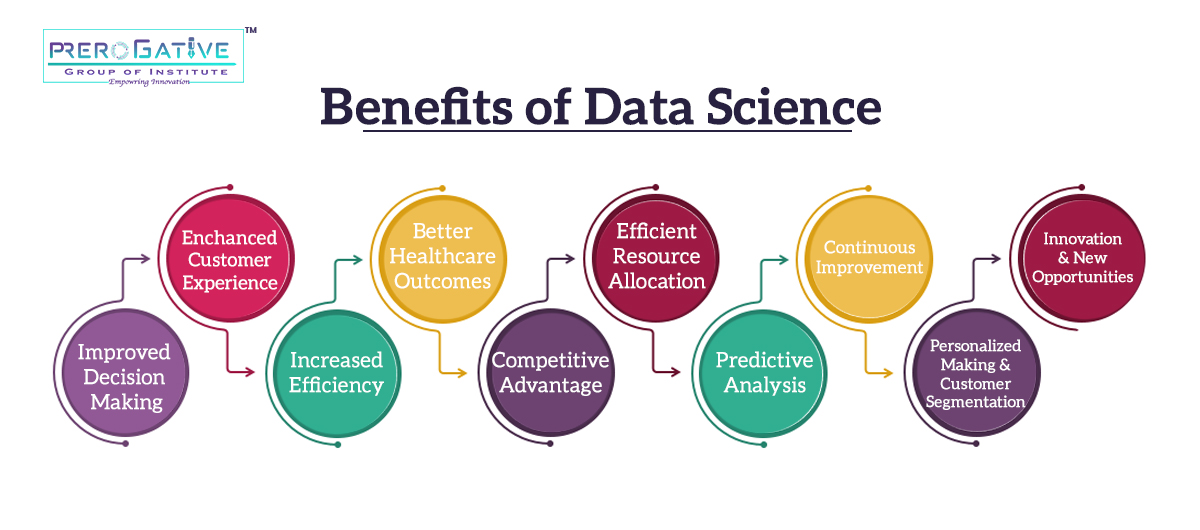Benefits of Data Science

In a world where data is generated at an unprecedented rate, businesses need a way to turn this raw information into valuable insights and actionable intelligence. This is where data science comes in. With its powerful combination of statistical analysis, machine learning, and computer science, data science has become a critical tool for businesses of all sizes and industries including Artificial Intelligence.
To master this tech-skill, you need to learn everyday and keep yourself updated with the latest trends and softwares. At Prerogative, we offer a data science internship program where industry experts having years of experience and practice are offering valuable learning and insights of their experience curated at a single place.
In this blog, we'll explore the many benefits of data science and how it is transforming businesses and industries across the globe.
Table of Contents
Fundamentals of Data Science
Data science is the study of data with the goal of deriving knowledge and insights from it. It assists people in making better decisions by using approaches from computer science, mathematics, and statistics. Implementing a variety of tools and approaches, data scientists process and analyze large datasets in order to find patterns and make predictions.
In one instance, a data scientist can examine data to determine how users interact with a website or product, and then utilize that knowledge to create changes that enhance the user experience. Today, a lot of businesses rely on data science to make smarter decisions and stay one step ahead of the competition. To know about the career scope of data science, you can also check out our latest blog.
Role of a Data Scientist

Working with data to resolve issues and form opinions is a data scientist's job. To analyze and process enormous datasets and to draw conclusions and information from them, they employ a range of techniques. A data scientist may help businesses and organizations by providing data-driven insights that can be used to make better decisions.
Using patient data analysis to find trends and patterns that may be used to improve patient outcomes, a data scientist might, for instance, work for a healthcare organization. Additionally, they may work for a retailer, where they would analyze data to create new goods and services and comprehend consumer behavior better.
Benefits of Data Science
Data science has many benefits, and it's quickly becoming an essential tool for businesses of all sizes.
- Improved Decision-Making
By using data to address problems and inform viewpoints, data scientists play a critical role in allowing better decision-making. To analyze and process massive datasets and to extract insightful data, they use a variety of methodologies. Data scientists' work offers data-driven insights that can enable companies and organizations to make wise decisions.
A data scientist might examine patient data in a healthcare organization, for instance, to find trends and patterns that can improve patient outcomes. In the retail sector, data analysis may be used to develop new goods and services and to have a better understanding of consumer behavior.
- Increased Efficiency
Business operations can be made more efficient and costs can be cut with the use of data science. Businesses can spot inefficiencies and potential improvement areas by analyzing data. Afterwards, modifications that boost efficiency while cutting expenses can be made using the knowledge.
To analyze its supply chain and locate bottlenecks that are creating delays, for instance, a corporation could use data science. The organization can shorten delivery times and boost overall efficiency by altering their supply chain in response to this information.
- Enhanced Customer Experience
Discovering customer preferences and behavior can be accomplished through data analysis. The customer experience can be improved by using this information to create goods and services that are catered to the needs of the user.
Using data science, a business may, for example, analyze prior customer purchases and make customized product recommendations. The probability of repeat business might rise as a result of this.
- Competitive Advantage
By empowering them to make better decisions and discover new opportunities, data science may provide firms a competitive edge. Businesses may remain competitive by utilizing data to obtain insights into their processes and customers.
A store, for instance, could use data science to examine sales data and spot fresh trends. Based on this knowledge, the merchant can create new products or change their marketing plan to benefit from these trends before their rivals.
- Predictive Analytics
Based on past data, data science can be used to forecast future results. Businesses can find trends and forecast future occurrences by using machine learning algorithms to analyze massive datasets. A healthcare professional could, for instance, use data science to identify the individuals most at risk of contracting a specific disease and provide preventive care due to this predictive analysis.
- Personalized Marketing and Customer Segmentation
Organizations can segment their consumer bases and develop individualized marketing efforts using data science. Businesses may send tailored and relevant communications that increase customer engagement and conversion rates by analyzing consumer data and behavior. This allows them to better understand individual preferences and needs.
For instance, a retail business can utilize data science approaches to recognize high-value clients and develop tailored marketing campaigns or loyalty schemes to improve client retention. Similar to this, an e-commerce platform can make pertinent product recommendations based on a user's browsing history and buying habits by using customer segmentation.
- Better Healthcare Outcomes
The healthcare sector could undergo a transformation because of data science. Data scientists can gain insights to increase diagnosis precision, optimize treatment strategies, and improve patient care, eventually resulting in better healthcare outcomes, by analyzing patient data, medical records, and clinical studies.
Additionally, by taking into account a patient's unique traits, such as genetics, lifestyle, and previous treatment outcomes, data science enables the optimisation of treatment programmes. Data scientists can find patterns and connections in large-scale clinical data that help them choose the best treatments for certain patient profiles.
- Efficient Resource Allocation
Utilizing data on resource utilization, demand trends, and supply chain dynamics, data science aids organizations in maximizing resource allocation. As a result, waste is reduced and operational efficiency is increased while resources like inventory, people, and equipment are appropriately allocated.
- Continuous Improvement
Organizations with a culture of continual development benefit from data science. Organizations can assess performance, monitor advancement, and pinpoint areas for development by analyzing data. This data-driven strategy encourages an attitude of constant improvement and innovation.
- Innovation and New Opportunities
Last but not least, data science may help companies innovate and spot new opportunities. Data science is becoming a driving force behind innovation, allowing companies to find fresh perspectives and untapped potential. Additionally, data science can find new business prospects by examining competition data, market dynamics, and consumer behavior.
Data science-driven innovation goes beyond just product creation. Additionally, it can apply to process innovation, in which businesses employ data analysis to spot inefficiencies, bottlenecks, and potential for automation or optimization.


Check out Prerogative’s top data science certification course with leading industry expert faculty team & potential career placement services.
Conclusion
In conclusion, data science has become a potent tool with many advantages for companies in a variety of industries. Data science enables organizations to make better decisions, increase efficiency, improve customer experience, acquire a competitive advantage, and open up new prospects through the application of advanced statistical analysis, machine learning techniques, and computer science.
Businesses may enhance decision-making procedures, spot inefficiencies, and optimize operations to promote efficiency and cost savings by utilizing data-driven insights. Furthermore, data science equips businesses to personalize marketing campaigns, forecast future results, improve healthcare delivery, allocate resources wisely, and promote a continuous improvement culture.
Frequently Asked Questions

The essentials of information science include a blend of information and abilities from different trains like math, measurements, software engineering, and space mastery.
The job of an information researcher is to remove experiences and information from information to tackle complex issues, settle on informed choices, and drive business or logical results. Here are a few critical obligations and undertakings regularly connected with the job of an information researcher.
Data science is the investigation of information to remove significant bits of knowledge for business. It is a multidisciplinary approach that joins standards and practices from the fields of math, insights, man-made brainpower, and PC designing to dissect a lot of information.
Information science incorporates different subfields or spaces, each with its particular concentration and strategies. Here are a few normal kinds of information science:
- Descriptive analytics
- Predictive analytics
- Prescriptive analytics
- Big data analytics






Leave your thought here
Your email address will not be published. Required fields are marked *